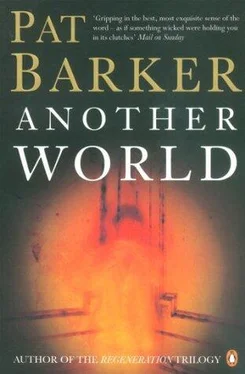The body sags, between the men carrying it, into a shallow U. Even a deeply unconscious man would respond to being moved in a slightly different way. There’d be some residual muscle tone to differentiate him from this limp parcel of dead meat which can do nothing to help itself or its bearers. Nick doesn’t want to see them carry it downstairs. Instead, he stays in the room, staring at the creased and rumpled sheets which, despite all his precautions with the towel, are slightly stained. He listens to the rustle of plastic, as the shuffling steps recede, thinking that the rumpled bed looks more like the scene of recent love-making, than a place where somebody had died. Again, on the cool air, the scent of Antaeus. Once more, Nick smells the pillows, the counterpane, his own fingertips, but there’s nothing there.
After the undertakers have driven away, Nick walks slowly along to the bathroom, where he looks into Grandad’s steel shaving mirror. There’s a syndrome that consists of an inability to recognize one’s own face. Perhaps he’s just succumbed to it, for the face that stares back at him is nothing like his own.
It’s late afternoon when he stops the car outside Helen’s flat and looks up at her window above the trees. There’s nobody else he wants to talk to now, nobody else who knows Geordie as intimately as he does. He presses the intercom and announces his name.
A crackle of sound that he hardly manages to identify as her voice tells him to come in. On his way up the four flights of stairs he pauses, not wanting to arrive gasping for breath, and from then on is puzzled by the sound of talking. She has the radio on perhaps, but then one of the voices — a man’s voice — starts to sound familiar. It’s somebody he knows. He hopes she hasn’t got one of their mutual colleagues with her. If she has, he decides, he’ll stay the minimum length of time, then make some excuse and leave.
Standing outside the door, hand raised to knock, he recognizes the voice as Geordie’s, and feels his skin roughening like the sea when the wind blows over it. Geordie, not dead, not silenced. Geordie, preserved on Helen’s tapes for ever. He’s singing the song his wife used to sing, to calm him, in the early days of their marriage, when his nightmares soaked her in sweat and she’d wake to find the sheets drenched with his piss.Keep yor feet still, Geordie hinny,Let’s be happy for the neet,For we may not be sae happy thro’ the day,So give us that bit comfort,
Helen’s voice joins in.Keep yor feet still, Geordie lad!And dinnet drive me bonny dreams away.
It’s a good moment, and he wonders whether she intended it for him, this reminder that the truth of Geordie’s life did not consist of those traumatic memories that erupted to plague his final months, but in the continuity of loving that had filled all the years between.
He needs to know. He knocks, and the door swings open. It’s been open all the time.
They’re in the room together now, not speaking because the tape’s still playing. The song ends in a burst of shared laughter. Helen clicks stop. She’s holding herself, as she looks down at the recorder, her face slightly averted from Nick. When she finally turns and raises her face to his, he sees her eyes are full of tears, and, without thinking, opens his arms to her.
They cling together, Helen choking back tears. After a while she pushes herself off his chest and says, unsteadily, ‘Drink.’
‘I’m driving.’
‘You can walk from here. Anyway, one won’t hurt.’
Yes, that’s true, he thinks, I can walk from here. ‘All right.’
The chink of ice in the glass, she knows exactly how he likes it, they’ve been friends for so many years. Miranda was a baby when they first met. She comes back into the room and hands him the glass. He moves further along the sofa to make room, but, struggling with tears, she shakes her head and goes to stand near the window, a spare dark shape silhouetted against an intricate network of branches. She raises her glass and drinks. The sunlight, catching the cut-glass, dazzles him.
He says, ‘He was in love with you.’
A turn of the head. ‘Yes, I know.’ A moment’s silence. Then: ‘How was it?’
‘His last words were, “I am in hell.”’
She waits. Nick realizes he can’t — daren’t — go on. After a while, he manages to say, ‘I want you to tell me about Harry.’
‘Yes.’ A faint smile. ‘I thought you might.’
‘You didn’t destroy the tape, did you?’
‘No, but it wasn’t because I was hanging on to it as raw material or anything like that. I couldn’t destroy it because it had his voice on it. It’s just something you can’t do — like tearing up a photograph. It’s — you don’t do it if you love the person. And I’m sorry I didn’t tell you, but he specifically asked me not to tell any of the family. I felt I had to respect that.’
‘Do you think you can tell me now?’
‘I think he can tell you now.’
One tape removed, another inserted. A squeak and gibber of distorted voices, and then Geordie’s in the room, as strong and vigorous as he’d always been, until a few short months ago.
GEORDIE: No, well, you see the idea was you all joined up together — a big crowd of us lads from the factory all went along together, and yeah, I think the idea was it was a big adventure. Not even that really, bit of a laugh. Better than the factory.
A long silence filled with the tape’s asthmatic breath. He’s in no hurry to talk about this.
HELEN: So you and Harry were together from the start?GEORDIE: We were in the same company. They didn’t do that so much, after the Somme, they learned the hard way. There were families, whole streets, where the lads were wiped out. After that they split brothers up.HELEN: Too late for you and Harry.GEORDIE: Yes.HELEN: What was it like being together?GEORDIE: Ah, well, now, what was it like? Well, you know, Helen, in my young days, men weren’t supposed to be frightened. If you were, you didn’t own up to it, it was something you were ashamed of. Now it’s all gone the other way. The idea now is: everybody’s frightened all the time. War, I’m talking about. Trouble is, that isn’t true either. Not everybody’s equally frightened all the time. There are some men who’re — I won’t say fearless. But as good as. Because fear to them’s like putting petrol in the engine. Harry was like that.HELEN: Did you mind that?GEORDIE: No, I was proud of him. In the run-up to the Somme there were these tremendous bombardments, they were supposed to be cutting the German wire to ribbons. And there was this officer in our company, he just didn’t believe it. He used to take parties out cutting the wire, he used to say, if I cut the bugger meself I know it’s been cut. This night — it was more like a raid than a patrol, they were waiting, their faces blacked up, helmets on, all you could see was the whites of their eyes and their teeth. I patted Harry on the back, and I says, Good luck, Harry. And they all bust out laughing, it was the wrong man. Well, no harm done, give ’em a laugh, but you know ever since — and I can’t get this out of me head — ever since there’s a part of me mind that thinks, If only I’d recognized him, if only I’d said, Good Luck to the right man, he wouldn’t have died.
Is that all? Nick thinks. One tiny incident magnified by a lifetime’s guilt at having survived. He opens his mouth to speak, but Helen raises her hand.
GEORDIE: Jerry twigged it. A flare goes up, all hell’s let loose. They all come crashing back into the trench, and I’m looking from one blacked-out face to another, trying to find Harry, and they’re worse now than they were when they set out. It’s just lumps of mud, walking. One of them’s bleeding. ‘Where’s Harry?’ And the officer counted them, one missing. And after the shells coming over died down a bit you can hear this scream, and it goes on and on and on. I know I’ve got to go out.
Читать дальше












